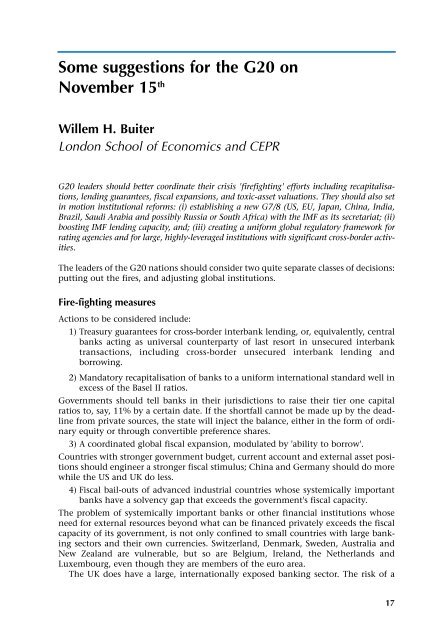What G20 Leaders Must Do To Stabilise our Economy and Fix ... - Vox
What G20 Leaders Must Do To Stabilise our Economy and Fix ... - Vox
What G20 Leaders Must Do To Stabilise our Economy and Fix ... - Vox
Create successful ePaper yourself
Turn your PDF publications into a flip-book with our unique Google optimized e-Paper software.
Some suggestions for the <strong>G20</strong> onNovember 15 thWillem H. BuiterLondon School of Economics <strong>and</strong> CEPR<strong>G20</strong> leaders should better coordinate their crisis 'firefighting' efforts including recapitalisations,lending guarantees, fiscal expansions, <strong>and</strong> toxic-asset valuations. They should also setin motion institutional reforms: (i) establishing a new G7/8 (US, EU, Japan, China, India,Brazil, Saudi Arabia <strong>and</strong> possibly Russia or South Africa) with the IMF as its secretariat; (ii)boosting IMF lending capacity, <strong>and</strong>; (iii) creating a uniform global regulatory framework forrating agencies <strong>and</strong> for large, highly-leveraged institutions with significant cross-border activities.The leaders of the <strong>G20</strong> nations should consider two quite separate classes of decisions:putting out the fires, <strong>and</strong> adjusting global institutions.Fire-fighting measuresActions to be considered include:1) Treasury guarantees for cross-border interbank lending, or, equivalently, centralbanks acting as universal counterparty of last resort in unsecured interbanktransactions, including cross-border unsecured interbank lending <strong>and</strong>borrowing.2) M<strong>and</strong>atory recapitalisation of banks to a uniform international st<strong>and</strong>ard well inexcess of the Basel II ratios.Governments should tell banks in their jurisdictions to raise their tier one capitalratios to, say, 11% by a certain date. If the shortfall cannot be made up by the deadlinefrom private s<strong>our</strong>ces, the state will inject the balance, either in the form of ordinaryequity or through convertible preference shares.3) A coordinated global fiscal expansion, modulated by 'ability to borrow'.Countries with stronger government budget, current account <strong>and</strong> external asset positionsshould engineer a stronger fiscal stimulus; China <strong>and</strong> Germany should do morewhile the US <strong>and</strong> UK do less.4) Fiscal bail-outs of advanced industrial countries whose systemically importantbanks have a solvency gap that exceeds the government's fiscal capacity.The problem of systemically important banks or other financial institutions whoseneed for external res<strong>our</strong>ces beyond what can be financed privately exceeds the fiscalcapacity of its government, is not only confined to small countries with large bankingsectors <strong>and</strong> their own currencies. Switzerl<strong>and</strong>, Denmark, Sweden, Australia <strong>and</strong>New Zeal<strong>and</strong> are vulnerable, but so are Belgium, Irel<strong>and</strong>, the Netherl<strong>and</strong>s <strong>and</strong>Luxemb<strong>our</strong>g, even though they are members of the euro area.The UK does have a large, internationally exposed banking sector. The risk of a17














